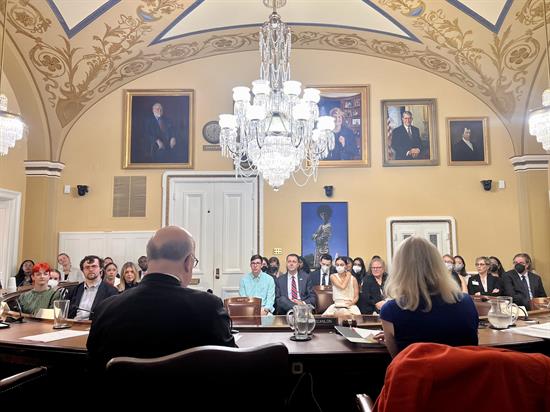McGovern, Scanlon Convene Panel to Examine Legal Aid's Role in Combating Hunger
Washington,
July 25, 2022
Washington, D.C. – Last week, Congresswoman Mary Gay Scanlon, Co-Chair of the Congressional Access to Legal Aid Caucus, Congressman James P. McGovern, Chairman of the House Committee on Rules and Co-Chair of House Hunger Caucus, and Congressman Brian Fitzpatrick, Co-Chair of the Congressional Access to Legal Aid Caucus, convened a panel of experts to discuss how legal aid providers are able to secure critical benefits for constituents, including food and nutrition assistance, at a time when food insecurity is of particular concern. The panel is part of the preparation for the White House Conference on Hunger, Nutrition, and Health in September 2022. Panelists included: Rachel Rossi, Director of the Office for Access to Justice at the Department of Justice; Ronald S. Flagg, President of the Legal Services Corporation; Gina Plata-Nino, Attorney at the Massachusetts Law Reform Institute; and Kyle Fradkin, Deputy Director of Public Policy at MAZON: A Jewish Response to Hunger. Rep. Scanlon, Chairman McGovern, Rep. Fitzpatrick, and the panelists discussed a range of topics, including how legal aid attorneys help people access food assistance and other important benefits, the impact of medical-legal partnerships, social determinants of health that legal services can help address, and the necessity for collective advocacy to address hunger issues, in addition to individual representation. “I spent decades working with the legal services community and know just how important access to quality legal counsel is for Americans navigating the complicated bureaucracy of our benefits programs,” said Rep. Scanlon. “As we prepare for the White House Conference on Hunger, Nutrition, and Health this September, it is important to prioritize consideration of what meaningful interagency collaboration on legal aid's role can look like in addressing hunger among veterans, seniors, students, and children. I’m grateful for the leadership of Chairman McGovern and the expertise of our panelists on these issues and look forward to continuing our work to expand access to justice and build a hunger-free America.” “Legal Aid attorneys are a critical part of mitigating hunger for our most vulnerable neighbors,” said Chairman McGovern. “They have a deep understanding of the cracks in our anti-hunger safety net and are incredible advocates for those struggling to access programs like SNAP and WIC, and bringing concerns to lawmakers’ attention. I’m grateful for the participation of advocates from Massachusetts Law Reform Institute, the Department of Justice Office of Access to Justice, Legal Services Corporation and MAZON whose valuable perspectives will inform the White House Conference on Hunger, Nutrition, and Health this September.” “I was honored to attend the Legal Aid Roundtable held by Rep. Scanlon last week,” said Rep. Fitzpatrick. “It is crucial that all American citizens have equal access to legal services and I will continue to advocate and work across the aisle to improve access and resources for those that need it most.” “Hunger doesn’t show up in isolation. It typically occurs amidst housing, family, health, and employment insecurity,” said Ronald S. Flagg, President of the Legal Services Corporation. “America’s legal aid providers are on the front lines every day in addressing these life-altering problems – and in increasing resources available for necessities, including food. Legal aid connects low-income Americans to the Supplemental Nutrition Assistance Program and other food security programs. Thanks so much to Reps. McGovern and Scanlon for bringing increased attention to this issue and identifying solutions.” "Legal aid advocates are often on the frontlines and are the ones seeing systemic barriers and issues facing broad groups of low-income families and communities," said Gina Plata-Nino, Attorney at the Massachusetts Law Reform Institute. "Through non-federal funding, the Massachusetts Law Reform Institute, a statewide poverty law center that also supports local Legal Services programs, has been able to delve deeply into law and policy reform. However, legal services programs throughout the nation that depend on federal Legal Services Corporation funding are expressly barred from addressing systemic problems in any meaningful way. This is due to long standing restrictions put on the Legal Services Corporation (LSC) in the 1970's. These restrictions significantly limit access to justice for poor people. Eliminating or substantially revising the LSC restrictions will allow legal advocates to tackle the root causes of food insecurity and poverty." “Access to food and nutrition services is clearly a matter of liberty and freedom, which unfortunately oftentimes can only be accessed with the help of the judicial branch of our government,” said Kyle Fradkin, Deputy Director of Public Policy at MAZON: A Jewish Response to Hunger. “As a national advocacy organization with nearly forty years in the fight to end hunger, we know that addressing food insecurity requires the combined work of policymakers, attorneys, advocates, and others to ensure that those who are entitled to programs like SNAP are not wrongly denied benefits, nor deterred by other barriers like onerous application processes. We are grateful to Congresswoman Mary Gay Scanlon, Chair of the Legal Aid Caucus, and Chairman Jim McGovern of the House Rules Committee, for inviting MAZON to participate in this important briefing and we thank Rep. Brian Fitzpatrick for attending the briefing as well. As we look to the forthcoming White House Conference on Hunger, Health, and Nutrition, we urge the Biden Administration to utilize this opportunity to consider the findings from this week’s briefing and propose bold policy ideas to address hunger in the United States.” ### |
Press Releases
Constituent Services
Read More
How can I help?
From getting answers from government agencies to cutting through red tape to get you results, my office is here to help.
